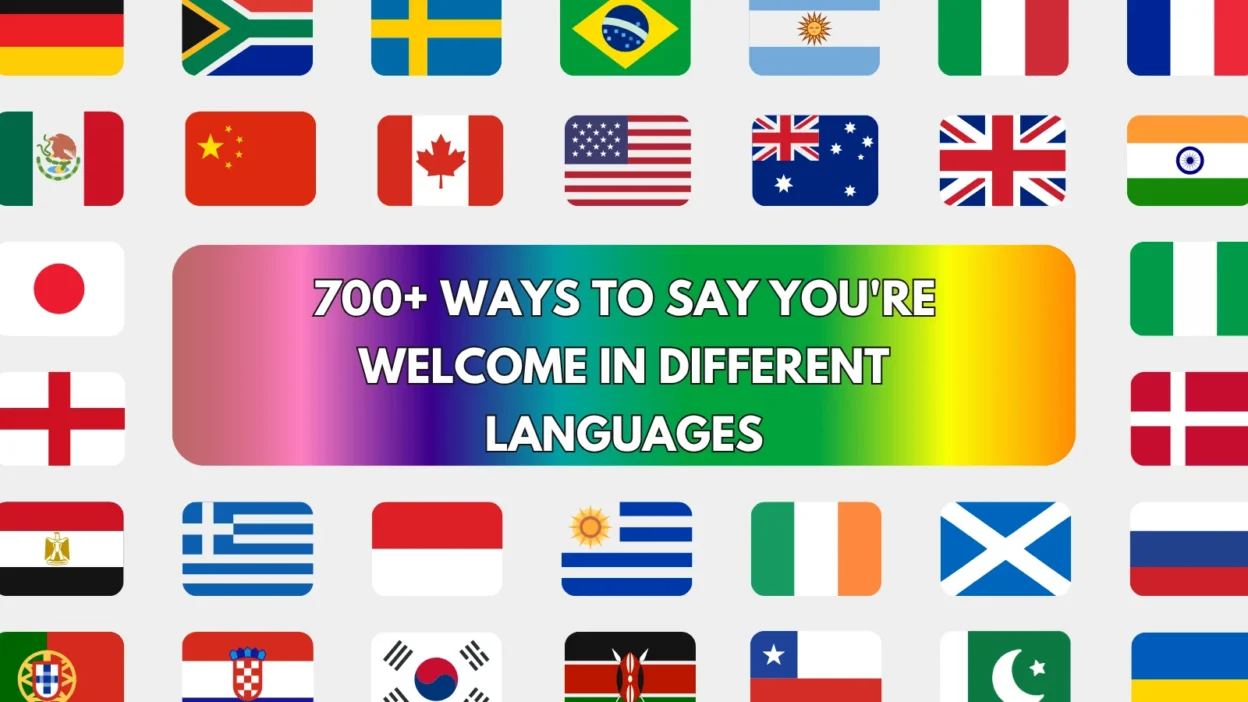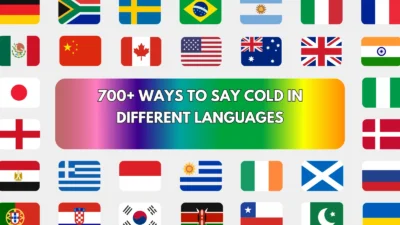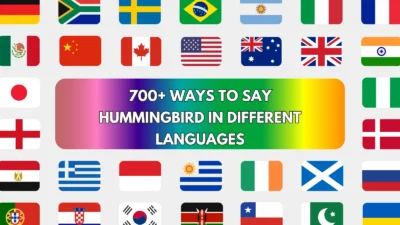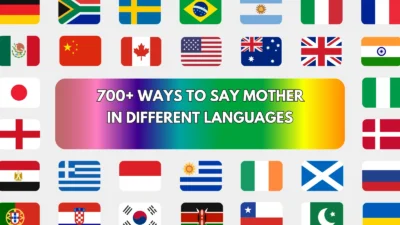When someone looks up “you’re welcome in different languages,” it’s often because they want to connect with others in a respectful, kind, and culturally-aware way. Whether you’re learning languages, traveling, meeting new people, or working in a global environment, knowing how to say “you’re welcome” can strengthen relationships and show mutual respect.
This article will guide you through 70 translations of “you’re welcome,” each with the country flag, native spelling, easy English pronunciation, and an example sentence. With this guide, you’ll feel confident replying to “thank you” in almost any language you encounter.
How to Say You’re Welcome in 70 Different Languages
- Spanish 🇪🇸 – De nada | Pronunciation: deh NAH-dah
Example: “Gracias por tu ayuda.” – “De nada.” - French 🇫🇷 – De rien | Pronunciation: duh ree-EN
Example: “Merci beaucoup.” – “De rien.” - German 🇩🇪 – Bitte | Pronunciation: BIT-tuh
Example: “Danke schön.” – “Bitte.” - Italian 🇮🇹 – Prego | Pronunciation: PRAY-go
Example: “Grazie mille.” – “Prego.” - Portuguese 🇵🇹 – De nada | Pronunciation: dee NAH-dah
Example: “Muito obrigado.” – “De nada.” - Dutch 🇳🇱 – Graag gedaan | Pronunciation: KHRAKH khuh-DAHN
Example: “Dank je wel.” – “Graag gedaan.” - Russian 🇷🇺 – Пожалуйста | Pronunciation: pah-ZHAH-loos-tah
Example: “Спасибо.” – “Пожалуйста.” - Arabic 🇸🇦 – عفواً | Pronunciation: AF-wan
Example: “شكراً.” – “عفواً.” - Chinese (Mandarin) 🇨🇳 – 不客气 | Pronunciation: boo kuh-chee
Example: “谢谢你。” – “不客气。” - Japanese 🇯🇵 – どういたしまして | Pronunciation: doh ee-tah-shee-mah-shee-teh
Example: “ありがとう。” – “どういたしまして。” - Korean 🇰🇷 – 천만에요 | Pronunciation: chuhn-mah-neh-yo
Example: “감사합니다.” – “천만에요.” - Hindi 🇮🇳 – स्वागत है | Pronunciation: swaa-gut hey
Example: “धन्यवाद।” – “स्वागत है।” - Urdu 🇵🇰 – خوش آمدید | Pronunciation: khush aam-deed
Example: “شکریہ” – “خوش آمدید” - Bengali 🇧🇩 – স্বাগতম | Pronunciation: swaa-gaw-tawm
Example: “ধন্যবাদ।” – “স্বাগতম।” - Turkish 🇹🇷 – Rica ederim | Pronunciation: ree-JAH ed-air-im
Example: “Teşekkür ederim.” – “Rica ederim.” - Persian 🇮🇷 – خواهش میکنم | Pronunciation: khaa-hesh mee-ko-nam
Example: “ممنون.” – “خواهش میکنم.” - Greek 🇬🇷 – Παρακαλώ | Pronunciation: pah-rah-kah-LO
Example: “Ευχαριστώ.” – “Παρακαλώ.” - Hebrew 🇮🇱 – בבקשה | Pronunciation: beh-vah-kah-SHAH
Example: “תודה רבה.” – “בבקשה.” - Swahili 🇰🇪 – Karibu | Pronunciation: kah-REE-boo
Example: “Asante.” – “Karibu.” - Vietnamese 🇻🇳 – Không có chi | Pronunciation: khong kaw chee
Example: “Cảm ơn.” – “Không có chi.” - Thai 🇹🇭 – ยินดี | Pronunciation: yin-dee
Example: “ขอบคุณค่ะ.” – “ยินดี.” - Polish 🇵🇱 – Proszę bardzo | Pronunciation: PRO-sheh BAR-dzo
Example: “Dziękuję.” – “Proszę bardzo.” - Czech 🇨🇿 – Není zač | Pronunciation: NEH-nee zahch
Example: “Děkuji.” – “Není zač.” - Romanian 🇷🇴 – Cu plăcere | Pronunciation: koo pluh-CHEH-ray
Example: “Mulțumesc.” – “Cu plăcere.” - Hungarian 🇭🇺 – Szívesen | Pronunciation: SEE-veh-shen
Example: “Köszönöm.” – “Szívesen.” - Finnish 🇫🇮 – Ole hyvä | Pronunciation: OH-leh HOO-va
Example: “Kiitos.” – “Ole hyvä.” - Norwegian 🇳🇴 – Vær så god | Pronunciation: VAIR shaw goo
Example: “Takk.” – “Vær så god.” - Swedish 🇸🇪 – Varsågod | Pronunciation: VAR-shuh-good
Example: “Tack.” – “Varsågod.” - Danish 🇩🇰 – Velbekomme | Pronunciation: VEL-beh-kom-meh
Example: “Tak.” – “Velbekomme.” - Ukrainian 🇺🇦 – Будь ласка | Pronunciation: bood’ LAHS-kah
Example: “Дякую.” – “Будь ласка.” - Slovak 🇸🇰 – Niet za čo | Pronunciation: nyet zah choh
Example: “Ďakujem.” – “Niet za čo.” - Bulgarian 🇧🇬 – Моля | Pronunciation: MOH-lya
Example: “Благодаря.” – “Моля.” - Serbian 🇷🇸 – Нема на чему | Pronunciation: NEH-mah nah CHEH-moo
Example: “Хвала.” – “Нема на чему.” - Croatian 🇭🇷 – Nema na čemu | Pronunciation: NEH-mah nah CHEH-moo
Example: “Hvala.” – “Nema na čemu.” - Estonian 🇪🇪 – Pole tänu väärt | Pronunciation: POH-leh TAH-noo vairt
Example: “Aitäh.” – “Pole tänu väärt.” - Latvian 🇱🇻 – Nav par ko | Pronunciation: nav par koh
Example: “Paldies.” – “Nav par ko.” - Lithuanian 🇱🇹 – Nėra už ką | Pronunciation: neh-RAH oozh kah
Example: “Ačiū.” – “Nėra už ką.” - Slovenian 🇸🇮 – Ni za kaj | Pronunciation: nee zah kai
Example: “Hvala.” – “Ni za kaj.” - Maltese 🇲🇹 – Ta’ xejn | Pronunciation: ta sheen
Example: “Grazzi.” – “Ta’ xejn.” - Welsh 🏴 – Croeso | Pronunciation: CROY-so
Example: “Diolch.” – “Croeso.” - Irish 🇮🇪 – Tá fáilte romhat | Pronunciation: taw FOL-chuh row-it
Example: “Go raibh maith agat.” – “Tá fáilte romhat.” - Scottish Gaelic 🏴 – S e do bheatha | Pronunciation: shay doh VEH-huh
Example: “Tapadh leat.” – “S e do bheatha.” - Haitian Creole 🇭🇹 – Pa gen pwoblèm | Pronunciation: pah gen pwob-lem
Example: “Mèsi.” – “Pa gen pwoblèm.” - Javanese 🇮🇩 – Sami-sami | Pronunciation: sah-mee sah-mee
Example: “Matur nuwun.” – “Sami-sami.” - Tagalog 🇵🇭 – Walang anuman | Pronunciation: wah-LANG ah-noo-MAN
Example: “Salamat.” – “Walang anuman.” - Filipino 🇵🇭 – Walang anuman | Pronunciation: wah-LANG ah-noo-MAN
Example: “Salamat.” – “Walang anuman.” - Malay 🇲🇾 – Sama-sama | Pronunciation: sah-mah sah-mah
Example: “Terima kasih.” – “Sama-sama.” - Indonesian 🇮🇩 – Sama-sama | Pronunciation: sah-mah sah-mah
Example: “Terima kasih.” – “Sama-sama.” - Sinhala 🇱🇰 – ඔබට සාදරයෙන් පිළිගනිමු | Pronunciation: oh-bah-tah sah-dah-rah-yen pee-lee-gah-nee-moo
Example: “ස්තුතියි.” – “ඔබට සාදරයෙන් පිළිගනිමු.” - Nepali 🇳🇵 – स्वागत छ | Pronunciation: swaa-gut chha
Example: “धन्यवाद।” – “स्वागत छ।” - Pashto 🇦🇫 – ښه راغلاست | Pronunciation: kha rah-gh-lahst
Example: “مننه.” – “ښه راغلاست.” - Tajik 🇹🇯 – Хуш омадед | Pronunciation: khoosh oh-mah-ded
Example: “Ташаккур.” – “Хуш омадед.” - Kazakh 🇰🇿 – Оқасы жоқ | Pronunciation: oh-kah-sih zhok
Example: “Рахмет.” – “Оқасы жоқ.” - Uzbek 🇺🇿 – Arzimaydi | Pronunciation: ar-zee-MY-dee
Example: “Rahmat.” – “Arzimaydi.” - Mongolian 🇲🇳 – Зүгээр дээ | Pronunciation: zu-GAIR day
Example: “Баярлалаа.” – “Зүгээр дээ.” - Tibetan 🇨🇳 – མཆོག་གིས་བཀའ་དྲིན་ཆེ། | Pronunciation: cho-gee ka-drin-chey
Example: “ཐུགས་རྗེ་ཆེ།” – “མཆོག་གིས་བཀའ་དྲིན་ཆེ།” - Hausa 🇳🇬 – Babu laifi | Pronunciation: bah-boo lay-fee
Example: “Na gode.” – “Babu laifi.” - Igbo 🇳🇬 – Nnọọ | Pronunciation: nn-AW
Example: “Imela.” – “Nnọọ.” - Yoruba 🇳🇬 – Ko to pe | Pronunciation: koh toh peh
Example: “O se.” – “Ko to pe.” - Zulu 🇿🇦 – Wamukelekile | Pronunciation: wah-moo-keh-LEH-kee-leh
Example: “Ngiyabonga.” – “Wamukelekile.” - Xhosa 🇿🇦 – Wamkelekile | Pronunciation: wahm-keh-leh-KEE-leh
Example: “Ndiyabulela.” – “Wamkelekile.” - Amharic 🇪🇹 – እንኳን ደህና መጡ | Pronunciation: en-kuan deh-nah me-tu
Example: “አመሰግናለሁ።” – “እንኳን ደህና መጡ።” - Tigrinya 🇪🇷 – እንቋዕ በዓል ኣለኻ! | Pronunciation: en-kwa ba-al a-le-kha
Example: “የቐንየለይ።” – “እንቋዕ በዓል ኣለኻ!” - Samoan 🇼🇸 – Fa’amalie atu | Pronunciation: fah-ah-mah-lee-ay ah-too
Example: “Fa’afetai.” – “Fa’amalie atu.” - Tongan 🇹🇴 – ‘Oku ou fiefia ke fai | Pronunciation: oh-koo oh fee-eh-fee-ah keh fye
Example: “Mālō.” – “‘Oku ou fiefia ke fai.” - Maori 🇳🇿 – Nau mai | Pronunciation: now my
Example: “Kia ora.” – “Nau mai.” - Hawaiian 🇺🇸 – Aloha | Pronunciation: ah-LOH-hah
Example: “Mahalo.” – “Aloha.” - Basque 🇪🇸 – Ez horregatik | Pronunciation: es or-reh-gah-teek
Example: “Eskerrik asko.” – “Ez horregatik.” - Galician 🇪🇸 – De nada | Pronunciation: deh NAH-dah
Example: “Grazas.” – “De nada.” - Catalan 🇪🇸 – De res | Pronunciation: deh res
Example: “Gràcies.” – “De res.”
Conclusion
Language is a universal gift — and learning how to say “you’re welcome” is a small yet meaningful act of kindness. Whether it’s prego, de nada, karibu, or não há de quê, the phrase opens the door to warmth, hospitality, and shared humanity. Every culture values gratitude and generosity, and this guide helps you embrace them both with a simple smile and the right words. Wherever you go, you’ll now be ready to say: “You’re welcome.”

Hadi Bhatti is a passionate writer and content creator at Saypadia, known for turning complex words, phrases, and internet slang into simple, easy-to-understand explanations. With a strong interest in language, meanings, and digital communication, Hadi focuses on helping readers understand what words really mean in everyday use. His writing style is clear, engaging, and user-focused, making learning both practical and enjoyable.




